Wheat Production in Changing Environments: Responses, Adaptation and Tolerance » książka
topmenu
Wheat Production in Changing Environments: Responses, Adaptation and Tolerance
ISBN-13: 9789811368851 / Angielski / Miękka / 2020 / 685 str.
Wheat Production in Changing Environments: Responses, Adaptation and Tolerance
ISBN-13: 9789811368851 / Angielski / Miękka / 2020 / 685 str.
cena 615,15
(netto: 585,86 VAT: 5%)
Najniższa cena z 30 dni: 578,30
(netto: 585,86 VAT: 5%)
Najniższa cena z 30 dni: 578,30
Termin realizacji zamówienia:
ok. 16-18 dni roboczych.
ok. 16-18 dni roboczych.
Darmowa dostawa!
Kategorie:
Kategorie BISAC:
Wydawca:
Springer
Język:
Angielski
ISBN-13:
9789811368851
Rok wydania:
2020
Wydanie:
2019
Ilość stron:
685
Waga:
0.97 kg
Wymiary:
23.39 x 15.6 x 3.61
Oprawa:
Miękka
Wolumenów:
01
Dodatkowe informacje:
Wydanie ilustrowane











